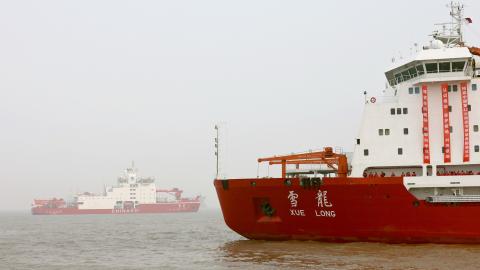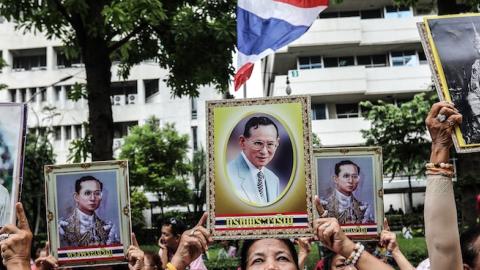King Bhumibol Adulyadej of Thailand, one of history’s longest-reigning monarchs, was a unifying figure in a deeply polarized country. His death will not lead to a short term crisis over the succession, but will further complicate the situation in Asia where a sharpening competition between three major powers (China, India and Japan) is creating the most unstable geopolitical conditions since the European power competition of the early 20th century turned a minor political crisis in the Balkans into the catastrophe of World War One.
For a very long time now, Thailand has tried to manage great power rivalries whenever possible by keeping a foot in each camp and balancing between them. That is how the Thais used the rivalry between Britain and France to keep their independence in an era when much of the world fell under colonial rule. It is how they survived World War Two when the Thais on the ground in Bangkok cooperated with the Japanese occupiers, even as the Thai ambassador in Washington declared a Free Thai government under American protection that ensured a Thai presence among the allies. During the Cold War and especially during the Vietnam War, the fear that the Communists would take over Thailand, overthrow the King, and dispossess the elite for the sake of a Communist revolution kept the country firmly in the pro-American camp. However the rise of a more complex situation since then, in which the Chinese Communist Party has become more like a traditional, pre-Western feudal elite and less of a revolutionary movement, has led the Thais to return to their own traditions of subtle balancing.
Meanwhile, however, homegrown tensions threaten the country's stability. Thailand is a complicated and diverse place: its southern provinces include many Muslims and ethnic Malays, and over the years various movements have sought, sometimes through violence, more autonomy and even outright independence. Today, these movements have increasingly been swept into the wave of radical violence and polarization convulsing so much of the Muslim world. More important these days, however, is the tension between the poorer provinces of the northeast and the cosmopolitan middle class and upper class in Bangkok. There, the old Thai elite and a newer mercantile and professional elite, including many ethnic Thais but also many "Sino-Thais" descended from Chinese immigrants who came mostly before the 1949 founding of the PRC, have created the power base that for the most part actually runs the country. In the past, this group tended to be both pro-West and pro-democracy. That changed when Thaksin Shinawatra, a Sino-Thai billionaire businessman with a flair for populism built a mass movement based on populist pro-farmer economic programs (price supports for rice, free health care, cheap credit for villages).
Shinawatra threatened the delicate balance of interests that kept the old status quo in place. In that system, the mercantile elite and its partners and associates among the traditional Thai power structure made money, the Army kept the country stable, and the charisma of the King, assisted by the religious teaching of the Buddhist hierarchy, kept the Thai farmers and poor reasonably contented with a sometimes harsh status quo. There were conflicts within the elite, especially between the civilians and the military, but the throne, with deep ties to both groups and the ability to mobilize public opinion, was able to arbitrate these disputes. The genius of the King lay in his ability to build a deep and genuine connection with rural Thailand. That connection enabled him to take what was in theory a constitutional monarchy with very limited powers and turn it into the heart of the national system. There is no doubt that King Bhumibol was a great ruler and an effective statesman.
The Shinawatra challenge came as old age increasingly diminished the Bhumibol's ability to manage the system he had established, even as the pressures on it grew. Shinawatra was able to challenge the King for the affection of the rural people: modern pork barrel politics as opposed to the patronage of a quasi-divine monarch. Elites feared, probably correctly, that Shinawatra would use his political power to create a dictatorship of some kind, and the civilian and democratic wings of the elite more or less united to throw him out and bring in military rule.
The King's death weakens those who now rule Thailand. The Crown Prince is not a replica of his father and in any case lacks the years of apprenticeship and training that ultimately made his father such a formidable political actor. Some of the northeast's traditional reverence for the throne had diminished during the long twilight of Bhumibol's reign as the King's old age and illnesses took him out of the public eye and reduced his ability to intervene. The military government now in power, with the support or at least the acquiescence of much of the previously pro-democratic urban middle class, must now survive without the legitimacy that the old King conferred.
This will influence Thai foreign policy moving forward. China's undemocratic and nepotistic form of government is a congenial partner for the Thai rulers, and American lectures about human rights, the rule of law and the need for free elections is less than welcome to a government that may feel the need for a tougher domestic approach without Bhumibol's guidance and prestige. At the same time, the Thais, with the elite very much included, have no interest in becoming a small entity in a Chinese hegemony. Closer relations with Japan and India may be one way that Thailand's new rulers can continue to balance their international interests with the demands of internal politics.
The next U.S. administration will have to deal very carefully and thoughtfully with a complex situation in Thailand. The stability of Thailand and its political orientation are very important to the evolution of events in Southeast Asia, and this is a part of the world that the us can neither take for granted or ignore. The King of Thailand's passing makes the task of American foreign policy more complicated than ever.















